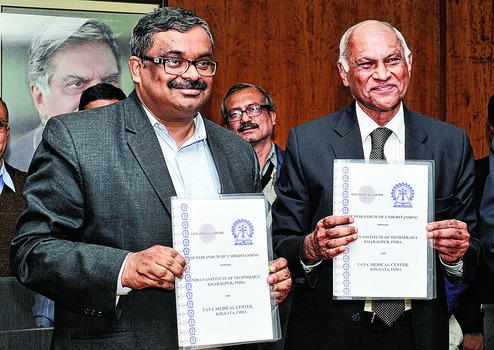
New Town: Tata Medical Center and IIT Kharagpur are set to roll out three courses in the use of high-end medical equipment and diagnostic technology for doctors and technicians.
The MSc-PhD programmes in molecular medical microbiology, medical physics and nuclear medicine will start in July. Each course will be of two years.
The programme in molecular medical microbiology will be for doctors and the other two for science graduates and engineers.
An MoU on the collaborative initiative was signed by Mammen Chandy, the director of Tata Medical Center, and Partha Pratim Chakraborty, the director of IIT Kharagpur, at the cancer hospital in New Town on Thursday.
"This is a unique collaboration where the technicians and doctors will get an in-depth knowledge of the machines used in medical treatment.... The research will have an outcome-based approach," Chakraborty said.
The theory classes of the courses will be held at both institutes and the practical classes at the hospital. Initially, each course will have eight seats.
"Many health-care units are willing to invest in expensive diagnostic machineries such as PET CT-scanner and linear accelerators but are unable to do so because of the unavailability of trained personnel. The courses in nuclear medicine and medical physics will start providing the manpower two years from now and thus more people will receive treatment," Chandy said.
Tata Medical Center is struggling to recruit trained personnel for the two more linear accelerators it plans to unveil this year. The two linear accelerators at the hospital are operated from 8am to 1am daily, yet the average waiting period for radiation therapy is three months.
The doctors who will enrol in the course in molecular medical microbiology will study molecules at the level of DNA.
"That is the way to find out quickly exactly which bacteria or fungus is causing an infection and leading to fever and to start the specific medication for its cure," Chandy said.
"The normal 'culture' of samples to confirm tuberculosis takes six weeks in the traditional method. By using the tools of modern microbiology, the same results can be obtained in six hours."
The two institutes are also launching from July a collaborative certificate course for oncologists. "We will use algorithms and clues from scan data and lab tests to find out how patients are responding to treatment. The aim is to detect patterns that will allow more specific treatment," said course coordinator Indranil Mullick.











